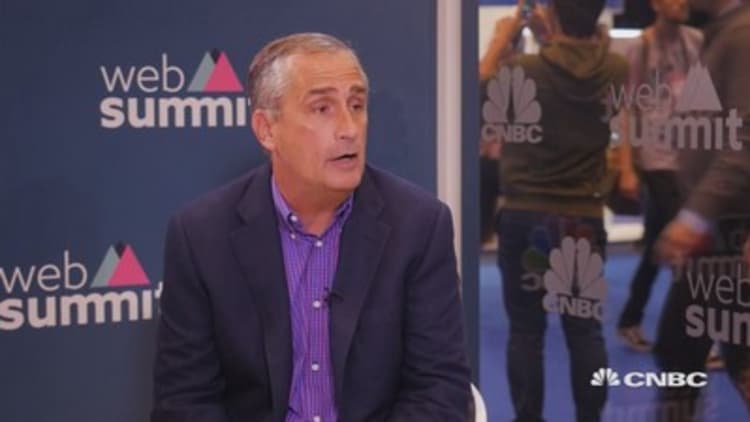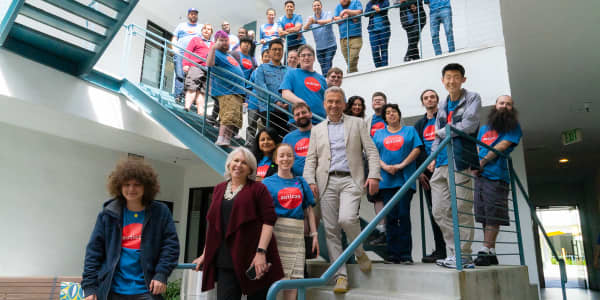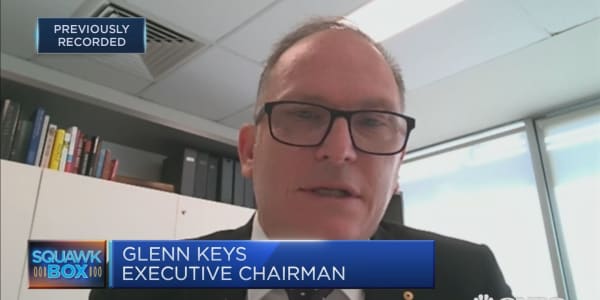When drug giant Pfizer announced earlier this year it was exiting the neuroscience business, including the search for a drug to treat Alzheimer's, doctors involved in the race to find a cure were caught off guard.
"I was surprised, because I knew they had interesting compounds in the pipeline," said Dr. Jeff Cummings, director of the Cleveland Clinic Lou Ruvo Center for Brain Health in Las Vegas. For Cummings, though, it was ultimately just one more addition to a long record he has maintained, documenting the failure of Alzheimer's treatments. "It is another statement that development of drugs, particularly for neurodegenerative diseases like Alzheimer's and Parkinson's, has proven to be enormously difficult."
In an influential report, Cummings quantifies exactly how "difficult" Alzheimer's drug development has been annually: The drug-failure rate hasn't budged from 99.6 percent in years. And it comes at a time when 1 out of every 5 cancer drugs (or roughly 20 percent) are successful, and as the current $259 billion cost of Alzheimer's care in the U.S. is projected to grow to an "unsupportable" $1 trillion annually by 2050, according to the Alzheimer's Association.
Cummings remains confident that it is only a matter of time — though that time may be measured in decades — before drugs are successfully developed. But the current Alzheimer's clinical research impasse has encouraged more doctors to pursue non-pharmacological alternatives. For most individuals — beyond the up-to-5-percent who are genetically predisposed to early onset Alzheimer's — focusing on lifestyle factors as the key to brain fitness and cognitive function, they say, is wiser than waiting for a breakthrough delivered in a pill.
Dr. Majid Fotuhi, speaking this week on brain fitness at the YPO Edge conference in Singapore, is among the most vocal brain fitness experts. He says the failure to find a blockbuster drug targeting proteins associated with Alzheimer's — in particular, beta amyloid and, to a lesser extent, tau — isn't going to reverse the disease, because it never made sense in the first place.
"The field of Alzheimer's has focused too much on these proteins," said Fotuhi, a doctor at Johns Hopkins Medicine and founder of private practice NeuroGrow, a brain fitness center. "Since the '80s many scientists have been saying, 'If only we can block the protein, we can cure Alzheimer's. And 30 years later the focus is on excuses — from giving the drugs too late to wrong dosages — for why the drugs haven't worked." He added, "Twenty percent of people in the field have similar ideas to mine, except 80 percent are dominating the news. Drug companies don't benefit from setting up cognitive therapy or mediation or telling people to sleep well."
The protein model of Alzheimer's also has become lucrative in the imaging field, where companies, including GE Healthcare, offer PET scan technology to measure amyloids in the brain, a procedure that can cost as much as $5,000.
"I think these are genuine people and they are not doing these things to put money and effort into what they know is a false starting gate," Fotuhi said. "These are intelligent people. It is the dogma that amyloid is the culprit. It's so obvious to me that amyloid is not the main culprit in late-life dementia."
Fotuhi says diet, exercise and sleep will do more to combat cognitive decline than major drug companies. Insomnia. Sleep apnea. Stress. High blood pressure. All these conditions that bridge psychological state and physical condition can lead to changes in the brain that will result in cognitive impairment. Recent research, though much of it preliminary, has indicated that methods to "grow the brain back" are all cheap and readily available, Fotuhi said.
"At least seven different studies show meditation grows the hippocampus back," he said. "Silence a few hours a day grew back the hippocampus. ... Every day there is a new research article showing exercise, just walking, and diet growing the hippocampus. I used to think the growth was from year to year, but now I think it is day to day."
Lifestyle choices can help delay, if not stop, onset of Alzheimer's
Cyrus Raji is a neuroradiology clinical fellow at the University of California, San Francisco. Earlier in his career, while at UCLA, he conducted research that showed diet and exercise have a positive effect on brain function. Recently, the American Academy of Neurology released guidelines for mild cognitive impairment — a stage at which symptoms have not clinically progressed to a high level but indicates the individual is at high risk for developing dementia. For the first time, the group recommended physical activity as an approach for managing mild cognitive impairment.
Drug companies are finally catching on that drugs targeting beta-amyloid do not help patients with Alzheimer's disease. Pfizer and Boehringer Ingelheim have stopped their clinical trials. My prediction is that others will soon follow.Dr. Majid Fotuhifounder of NeuroGrow and a doctor at Johns Hopkins Medicine
"We went from not even thinking about it a decade ago to being part of guidelines," Raji said. "Will these people never get Alzheimer's? No, but it may be the difference between getting it at 65 and 95," Raji said. Then he added, "If you can delay the onset for 30 years, you can cut down on the number of cases."
Cummings of the Cleveland Clinic said there is more data supporting the thesis that lifestyle can delay the onset of cognitive decline, including exercise, diet, sleep and mental connectedness. But he said some claims are "overstated."
"Once someone gets the disease, we will need drugs," Cummings said. "Once the brain mechanisms are overwhelmed, we will need drugs, so we need to balance the preventive opportunities in lifestyle and drug treatment. There might be room for marginal improvement from lifestyle after the disease has already started."
"Drug companies are finally catching on that drugs targeting beta-amyloid do not help patients with Alzheimer's disease," Fotuhi said. "Pfizer and Boehringer Ingelheim have stopped their clinical trials. My prediction is that others will soon follow. ... Results will not be promising, because there is so much more to brain health and brain mortality than a protein."
Fotuhi also has a prediction about what comes after the drug race ends: "Ten years from now people will be talking about the size of their hippocampus just the same way they talk about their cholesterol level these days, and how exercise, meditation or taking a dance class has helped," he said. "Brain stimulation keeps you young; you use it or lose it. Just like muscles," he said. "I challenge my patients to have a better memory every year."
Reasons to remain optimistic about drug treatments
While the Pfizer exit from Alzheimer's drug research was unexpected, Cummings said public companies with shareholders are often required to make decisions based on potential return to shareholders, which in the case of Alzheimer's "has been poor, so rather than continue to struggle, they chose to get out." But Cummings said the history of the drug sector has shown again and again that when an area becomes productive financially, it will attract capital from all of these companies again. And he does believe that drug success will come, though given the failures, he will not put a timeline on it.
"I continue to be optimistic," Cummings said. "We have learned an enormous amount and truly transitioned from shots in the dark to shots on goal. Drugs out there have promise."
In the least, Cummings does believe the narrow focus on two proteins cannot continue if the drug sector wants success. "We need a larger repertoire of targets. The amyloid hypothesis has not yielded success. Looking beyond the two proteins, particularly beta-amyloid, is extremely important."
Cummings said that some of the biggest challenges are not the drug trials themselves. The overall level of funding is one — though Alzheimer's is the most costly disease, it gets one-third of the funding from the government that cancer research does. The National Institutes of Health spends an annual $6 billion on cancer research, more than $4 billion in heart disease research, $3 billion on HIV/AIDS research and less than $2 billion on Alzheimer's, or less than two-thirds of one percent of the annual cost of Alzheimer's to the nation. Though Cummings has been encouraged by recent Congressional action and bipartisan support to increase funding by another $400 million. Lack of qualified participants for clinical trials — more than 50,000 are needed — has also slowed progress, and he says one of the most important messages he can share with the public is to take part in trials.
He remains encouraged that technology is advancing in ways that will spur drug development, including new blood tests for Alzheimer's and biomarkers that allow researchers to map and study the brain more accurately. "We have tools we've never had before," he said. The FDA also announced this week a change in the way Alzheimer's clinical trials are rated that may help to reduce the unusually high failure rate.
Raji at UCSF is currently conducting neuroradiology research using a form of MRI to track different parts of the brain and to see if doctors can learn to more accurately predict who will get Alzheimer's. "If we can get this to work, we can envision a future where if patients have risk factors or lifestyle issues and it's not good for brain health, they could be eligible for the MRI and given metrics. Alzheimer's takes 20 years to develop, but we don't want to wait until the end to know it is there, when too much damage has been done," Raji said.
Cummings knows that optimism about a successful drug measured tentatively in decades doesn't change the fact that there are still 5.5 million today without meaningful therapy. "The key is making progress. If we get there by 2040, we still save millions of brains and lives," he said.
This week, the annual Brain Prize worth €1 million was awarded to researchers focused on amyloid targeting. They said the reason the effort has failed so far is that drugs are delivered at a stage when the disease has already progressed too far. In comments to the press they expressed confidence about finding a successful drug within five years and Alzheimer's will disappear as a major problem for society within a decade.
Fotuhi isn't holding his breath. "I've been waiting 20 years to be proven wrong."






